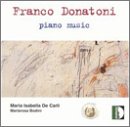| All Artists: Franco Donatoni, Maria Isabella De Carli, Mariarosa Bondini Title: Franco Donatoni: Piano Music Members Wishing: 0 Total Copies: 0 Label: Stradivarius Original Release Date: 1/1/2003 Re-Release Date: 2/4/2003 Genre: Classical Styles: Chamber Music, Historical Periods, Classical (c.1770-1830) Number of Discs: 1 SwapaCD Credits: 1 UPCs: 723724525726, 8011570336279 |
Search - Franco Donatoni, Maria Isabella De Carli, Mariarosa Bondini :: Franco Donatoni: Piano Music
 | Franco Donatoni, Maria Isabella De Carli, Mariarosa Bondini Franco Donatoni: Piano Music Genre: Classical
|
Larger Image |
CD Details |
CD ReviewsPlayful scherzi timbral hedonist scarecrow | Chicago, Illinois United States | 10/14/2003 (5 out of 5 stars) "The late Franco Donatoni sits fairly in the center of The Italian avant-garde(what was!) Now the Italians as well have been bitten by the various conceptual bugs, and buzzes relevant to postmodernist viruses, canons and force fields, you have either the complexity cadre, great interesting creators as Salvatore Sciarrino,Gervasioni,Sylvia DiLotti or Chiara Benati or the more accessible veins as in the theatrical lifeworlds of opera, as the music of Luca Lombardi, Lorenzo Ferrero, Fabio Vacchi.Donatoni at one time virtually taught and nurtured the entire Italian Boot, travelling to see student compositions from Milan, Rome and Naples, laying his seeds(semi) as he went.
His beginnings in the 1950s had hit all the languages of the avant-garde dabbling in early graphic notations and pointillisms and the "Black and White n.2" exhibits with its tortured pursuit of time encompassing the entire keyboard with directly iterated atonal chords and singular atonal basso declamations, somewhat arrogant and authoritative.He really had nothing original to say within this early avant-garde language.Perhaps it was too cold and barren a place for him a Mediterranean soul use to warm breezes,beaches, and sunlight.Stockhausen's various Klavierstuck, and John Cage's Piano music,both music from colder climates,from Northern Europe or darknesses of Manhatten in the 1950s.Both it is well known now had virtually dominated this serial indeterminate language leaving nothing in its aftermath.Even Berio was stymied with barely a few piano pieces directly influenced by Herr Stockhausen.For Donatoni it is not till the Eighties where the real creative genius comes forth, all with fascinating threadbare affinity for short miniature expressions,shapes,and forms, musical structures which have no life in their continuation or development. Adorno said some place that for modernity to live it must be nurtured by musical form, and form only. Donatoni's music seems contented merely to remain as an outcast within the encapsulated small,piccolo shell of durational times, as the pieces on this CD "Leoncavallo" a mere 35 seconds, or ". . . a Renzo e Marcella" (1990) a mere 56 seconds, "A Francoise" (1983) 37 seconds. All these works allow us to listen all the more intently, focused on their timbre. That's the creative calculaus of the musical miniature, it allows us to listen allowing modernity to live a life. His massive Francoise Variations which is not here is a work written over decades. Perhaps time itself is what gives Donatoni a sense of how his music is to proceed, and impart itself into the world.That other side is here as well, the more developed and most widely played "Rima" (1983) here you have incessant reiterations of etude-like arpeggios travelling short distances,very punctuated with accents,not going too far afield,like a raven sent on a phanthom string,knowing it will return,and, again Donatoni's very playful, sarcastic content only the Italians can summon seems to be what propells this music forward, It is not a British playfull humour, the dropping of the pants(Monty Python), or tripping over garden gnomes,The Italianate comedic is more the flick of the eyebrow,an eyebrow tremoli at times as Cecelia Bartoli can while she works her seductive magics,or the upturning of the lower chin in a opaque questioning demaenor, not committed toward answering your question.With this script Donatoni can summon then the most highly combustable expressionistic energy of the piano. His music always seems to have a clean, threadbare surface,dark and authoritative when it needs to be,yet very easy to listen to,fast,quicksilver,wistful most of the time,penumbral as well dark but always with a sense of directions out of the tunnel. The music centers many times around short bursts,like jazz "licks" this usually foreclosed with chordal declamations to let us know that this still remains serious detritus floating by us.The two lady pianists here worked with Franco, and both capture admirably these lifeworld musical narratives." |

 Track Listings (15) - Disc #1
Track Listings (15) - Disc #1